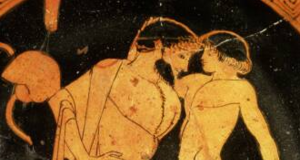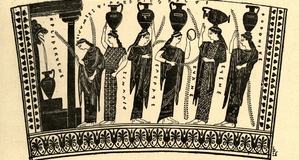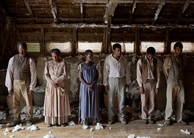Opinion:Gay Marriage in Antiquity: How Far Have We Come?
By
2010, Vol. 2 No. 03 | pg. 1/1
KEYWORDS:
Mention the phrase “gay marriage” to any American and you can almost always expect some type of response. Everyone, it seems, has an opinion on the topic. Regardless of which side you’re arguing for though, it’s hard to deny that the gay rights movement that America is currently experiencing feels remarkably similar to many events of our past: Abolitionism, the Civil Rights Movement, Women's Suffrage -- seemingly a confirmation of the old adage that history repeats itself. In fact, many factors of the battle for gay rights echo back all the way to ancient Greek and Roman societies in which “homosexuality" was, for the most part, accepted as a social custom. (Then, homosexuality was better defined as “same-sex desire,” since the Greeks and Romans had no concept of modern homosexuality (Hubbard, Introduction: 1)).Marriage between males was not uncommon in ancient Rome; there are many references to it, in fact, and none of them are favorable, such as Lucian’s strange science fiction story about “gay marriage” on the Moon, described as an “unusual custom” (Lucian, True History 1.22). However, the most scandalous of these reports seem to be those involving the Emperor Nero, who participated in wedding ceremonies with men on at least three different occasions. The first, to Sporus: “[Nero] had a boy named Sporus castrated and tried to transform him into an actual woman; he married him in a regular wedding ceremony, with a dowry and a bridal veil, took him home in front of a great crowd, and treated him as his wife. A witty remark that someone made about this is still circulating: that human kind would have been well off, if his father Domitius had had the same kind of wife” (Suetonius, Nero 28-29). The second, to Doryphorus, in which Nero was the bride: “…he invented a new kind of game (so to speak) in which, dressed in the skin of a wild animal, he was released from a cage and attacked the private parts of men and women who were bound to stakes and, when he had had enough of this savagery, he was finished off (as it were) by his freedman Doryphorus. This Doryphorus he took as his husband, just as Sporus had with him, and in doing so he imitated the cries and wailing of a virgin who is being raped” (Suetonius, Nero 28-29). And the third, to Pythagoras, in which he was also the bride: “A veil was placed over the emperor, the interpreters of the auspices were sent; a dowry, a wedding bed and marriage torches -- in the end, everything that is concealed by night even in the case of a woman was on display” (Tacitus, Ann. 15.37). In each of these cases, the marriage between two men is presented as being something out of the ordinary, though not unheard of. In fact, the shock factor of Nero’s weddings comes more from the fact that he was willing to take on the role of bride (not to mention his many other illicit sexual acts) rather than from the fact that the wedding participants were non-traditional. This should be explained. First of all, for a Roman man to marry another man would mean that one of the two would have to “be the woman.” This defies the Roman idea of viri, or manliness (Williams, Chapter 5: 163). Secondly, the definition of Roman marriage was strictly between a male and a female. The Latin verb matrimonium signified Roman marriage as “an inherently hierarchical institution structured around the pervasive power-differential between freeborn Roman men and everyone else, in this case women” (Williams, Appendix 2: 247). So, much like our current society, where a symbolic “marriage” between two men would only have meaning in private, so too would a Roman marriage between males lack the legal status of a marriage between a male and a female. There is very little mention of marriage between males in the Greek history of same-sex desire and interactions. Perhaps the closest we can come to evidence of any form of lasting homosexual Greek relationship resembling marriage was that of Agathon and Pausanias. This eromenos-and-erastes pair remained a couple far longer than was traditional in Greek pederastic relationships. Based on the evidence available, it is thought that neither man every had a wife or children, and in fact, when Agathon emigrated to Macedonia sometime between 411 and 405 to pursue his career as a dramatist, Pausanias went with him (Dover, II.C.4.: 84). However, there’s never any mention of marriage in conjunction with this couple’s story. It can be assumed, then, that the idea of marriage between Greek males was rather unheard of and that the act rarely occurred, if it ever did, which would coincide with the Greek idea, similar to the Roman one, of manliness. Perhaps some of this sounds familiar. That’s because the Greek and Roman idea of marriage is very similar to the traditional view of marriage held by many in today’s American society. The main opponents of the gay marriage initiative today are religious institutions who use Biblical scripture as an excuse to prohibit gay men and women from marrying in every state except for Massachusetts, Connecticut, Vermont, Iowa, and briefly, California (Johnson). Quite apart from the fact that the involvement of church groups in the legal institution of marriage smashes the American idea of the separation of church and state to pieces, the Bible is an extremely outdated volume that can be interpreted in many different ways. Yet it has been used successfully to ensure that bigotry and prejudice is present in many state constitutions. As Lisa Miller writes in her Newsweek article “Gay Marriage: Our Mutual Joy,” “Not since 1860, when the country's pulpits were full of preachers pronouncing on slavery, pro and con, has one of our basic social (and economic) institutions been so subject to biblical scrutiny” (Miller). There are many problems with the religious argument against gay marriage. Most are rather obvious: the extreme changes our society has undergone since the Bible was written, the changes the Bible has undergone itself due to many translations from the original Hebrew, and the hypocritical pick-and-choose method that most Christians use when it comes to following the Bible’s and God’s teachings. Even more important is the fact that marriage is not actually explicitly defined in the Bible as a union between a man and a woman. As if all this weren’t enough, there is even mention in the Bible itself of a same-sex relationship, though the exact nature of the relationship is uncertain: “Gay men like to point to the story of passionate King David and his friend Jonathan, with whom he was ‘one spirit’ and whom he ‘loved as he loved himself.’ Conservatives say this is a story about a platonic friendship, but it is also a story about two men who stand up for each other in turbulent times, through violent war and the disapproval of a powerful parent. David rends his clothes at Jonathan's death and, in grieving, writes a song: I grieve for you, Jonathan my brother; This is damning evidence indeed for an argument built entirely on the teachings of the Bible. If the Bible “praises enduring love between men” (Miller), then why are religious conservatives so up in arms about the idea of gay marriage? It is important to note that though the ancient Greek and Roman cultures share many of the traditional ideas about marriage that today’s religious groups do, they hold these ideas for very different reasons. Where gay marriage is seen as wrong by Americans today because certain Christian ideals, gay marriage in Greece and Rome was only considered taboo because one of the males involved would have to take on the role of the bride. So the question still remains: can modern America learn from the same-sex behavior and attitudes of ancient Greece and Rome? The short answer: no, we can’t. Though these ancient cultures were far more accepting of same-sex interaction than our modern American culture is, the fact remains that they both share similar ideas about how marriage should be, and there is no room in any of these cultures for the concept of gay marriage as anything more than a joke (as in ancient Rome, witnessed by the reactions to the Emperor Nero) or a corruption of the sanctity of marriage (in modern America). Perhaps someday our descendants can look back in American history and see that at some point we finally changed our Constitution to allow all of our citizens to be equal under the law. Until then, modern Americans will continue to agree with the Greeks and Romans about the existence of gay marriage. ReferencesDover, K.J. Greek Homosexuality. Massachusetts: Harvard University Press, 1978. Hubbard, Thomas K., ed. Homosexuality in Greece and Rome. California: University of California Press, 2003. Johnson, Ramon. “Gay Marriage Rights: Where is Gay Marriage Legal?” 7 April 2009. <http://gaylife.about.com/od/samesexmarriage/a/legalgay marriag.htm> Lucian, True History 1.22 (Hubbard 10.11: 471-472). Miller, Lisa. “Gay Marriage: Our Mutual Joy.” 6 December 2008. <http://www.newsweek.com/id/172653> Suetonis, Nero 28-29 (Hubbard 9.7: 390-391). Tacitus, Ann. 15.37 (Williams, Appendix 2: 250). Williams, Craig A. Roman Homosexuality. New York: Oxford University Press, 1999. Suggested Reading from Inquiries Journal
Inquiries Journal provides undergraduate and graduate students around the world a platform for the wide dissemination of academic work over a range of core disciplines. Representing the work of students from hundreds of institutions around the globe, Inquiries Journal's large database of academic articles is completely free. Learn more | Blog | Submit Latest in Opinion |


















